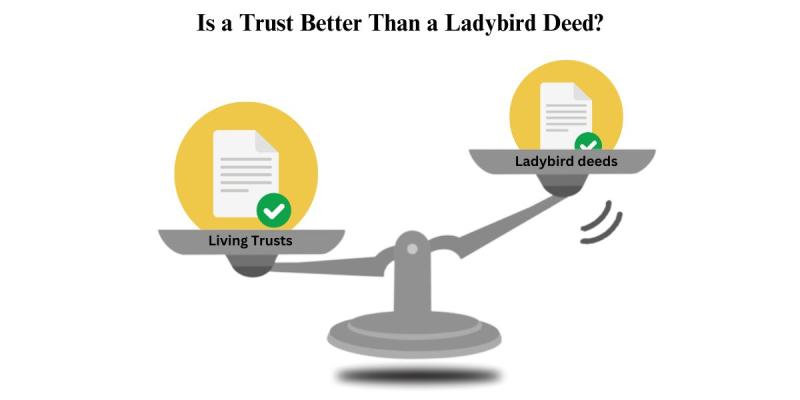Lady bird Deed vs Living Trusts - Making the Right Choice

Lady bird Deed vs Living Trusts - Making the Right Choice
In estate planning, you have various options to consider, each with its own set of advantages and drawbacks. Two popular choices are revocable living trusts and ladybird deeds, also known as enhanced life estate deeds. In this guide, we will explore these tools in detail. This will help you make a smart choice that fits your needs and goals.
Understanding Trusts and Deeds
Before we explore revocable living trusts and ladybird deeds, let's first understand these ideas.
The Basics of Ladybird Deeds
A ladybird deed, also known as an enhanced life estate deed, is a legal document. It lets you transfer ownership of your property. You can still live in and control the property during your lifetime.
Revocable living trusts offer many benefits. This is why they are a popular choice for managing an estate. passing, the ownership automatically transfers to the designated beneficiary or beneficiaries without the need for probate.
The Basics of Revocable Living Trusts
A revocable living trust is a legal tool you create while you are alive. You transfer ownership of your assets into this trust. As the grantor, you maintain control over the trust and can modify or revoke it at any time.
When you pass away, the trust becomes permanent. The chosen trustee will manage and distribute the assets as instructed.
Ladybird Deed vs. Revocable Living Trust: Key Differences
While both ladybird deeds and revocable living trusts serve as estate planning tools, they differ in several key aspects:
- Asset Transfer: With a ladybird deed, you transfer ownership of a specific property, typically your primary residence. A revocable living trust can hold different types of assets. These include real estate, bank accounts, investments, and personal belongings.
- Probate Avoidance: Both ladybird deeds and revocable living trusts can help avoid probate for the assets they cover. However, a revocable living trust provides more comprehensive protection, as it encompasses all assets transferred into the trust.
- Flexibility: Revocable living trusts offer greater flexibility for asset management and distribution. You can modify the trust's terms, add or remove beneficiaries, and make changes as your circumstances evolve. Ladybird deeds, on the other hand, are more rigid and primarily focused on the transfer of a specific property.
- Privacy: Revocable living trusts are usually more private than ladybird deeds. The details of the trust are not in public records. Public land records record ladybird deeds, making the transfer of property ownership more transparent.
Benefits of Revocable Living Trusts
Revocable trusts provide numerous benefits, making them a favored option for estate planning:
- Probate Avoidance: By putting your assets into the trust, you can avoid the long and expensive probate process. This helps make the distribution of your estate smoother and more efficient.
- Privacy and Control: Revocable living trusts offer more privacy than wills. Public records do not include the details of the trust. Additionally, you maintain control over the trust and can modify or revoke it at any time during your lifetime.
- Incapacity Planning: If you become unable to manage your affairs, a revocable living trust can help. It allows your chosen successor trustee to manage your assets. This way, you can avoid needing a court-appointed conservatorship.
- Asset Protection: Depending on your state's laws, some creditors and lawsuits may not access assets in a revocable living trust. This offers extra protection for your estate.
- Flexibility: Revocable living trusts offer flexibility for asset management and distribution. You can specify how and when you want to distribute your assets and make changes to the trust's terms as needed.
Benefits of Florida Lady bird Deeds
While ladybird deeds have a more specific purpose, they offer several advantages for Florida residents:
- Probate Avoidance for Real Estate: A ladybird deed lets you transfer ownership of your home or other property to your chosen beneficiaries. This process avoids probate, which saves you time and money.
- Retaining Control and Ownership: Even after transferring ownership, you still keep full control of the property during your life. This means you can live there, make improvements, and sell or mortgage it.
- Medicaid Planning: Ladybird deeds can help with Medicaid planning. Transferring ownership through these deeds does not count as a disqualifying asset transfer for Medicaid.
- Simplicity: Ladybird deeds are usually simpler and cheaper to set up than revocable living trusts. This makes them a good choice for people with smaller estates that mainly involve real estate.
How to Create a Revocable Living Trust
Creating a revocable living trust involves several steps:
- Identify Your Goals and Objectives: Clearly define your estate planning goals. These may include avoiding probate, providing for beneficiaries, or protecting assets from creditors.
- Choose a Trustee: Appoint a trustee who will manage and distribute the trust assets according to your instructions. This can be you during your lifetime, or a trusted individual or professional trustee.
- Prepare the Trust Document: Work with a skilled estate planning lawyer to create the trust document. This document will explain the trust's terms, list the beneficiaries, and provide instructions for asset distribution.
- Transfer Assets to the Trust: After you set up the trust, you must transfer ownership of your assets into it. This includes real estate, bank accounts, and investments.
- Maintain and Update the Trust: Regularly review and update the trust as your situation changes. This includes adding or removing beneficiaries, changing distribution instructions, or altering the trustee.
How to Create a Florida Lady Bird Deed
The process of creating a Florida ladybird deed involves the following steps:
- Identify the Property: Determine the specific property or properties you wish to transfer using a ladybird deed.
- Choose Beneficiaries: Choose who will get ownership of the property when you pass away. This could be your children, spouse, or other chosen beneficiaries.
- Prepare the Ladybird Deed: Work with a qualified real estate attorney or title company. They can help you draft the ladybird deed. Make sure it meets all legal requirements in Florida.
- Execute and Record the Deed: Sign the ladybird deed in front of a notary public. Then, record it with the county clerk's office where the property is.
- Retain Ownership and Control: You can keep living on the property and paying taxes. You should also maintain it as you usually do. The ladybird deed does not transfer ownership right away.
The Legal Implications of Trusts and Ladybird Deeds
While both revocable living trusts and ladybird deeds offer estate planning benefits, it's crucial to understand their legal implications:
- Tax Considerations: Transferring assets into a revocable living trust or using a ladybird deed can have tax effects. This may include possible gift or estate taxes. Consulting with a tax professional is essential to understand the tax consequences specific to your situation.
- Creditor Protection: The level of creditor protection from revocable living trusts and ladybird deeds can differ by state laws. It also depends on the specific details of your situation.
- Medicaid Eligibility: While ladybird deeds can be useful for Medicaid planning, revocable living trusts may impact your eligibility for certain government benefits. Seeking guidance from an experienced attorney is important to navigate these complexities.
- Legal Requirements: You must properly sign revocable living trusts and ladybird deeds. They also need to follow all state laws to be valid and enforceable.
Seeking Professional Advice: Consult with an Estate Planning Attorney
Estate planning can be complex and has legal implications. Getting advice from an experienced estate planning attorney is best. An attorney can:
- Evaluate Your Unique Situation: By knowing your goals, assets, and family situation, an attorney can give you personalized advice. They can help you decide if a revocable living trust, a ladybird deed, or both are right for you.
- Ensure Compliance: An attorney can help ensure you write and sign your estate planning documents correctly. This includes trusts and ladybird deeds. They will follow state laws to reduce the chance of legal problems or invalidation.
- Provide Ongoing Support: Estate planning is an ongoing process. An attorney can help you review and update your plan regularly. This ensures it reflects changes in your life, like marriage, divorce, or the birth of new beneficiaries.
- Coordinate with Other Professionals: A florida estate planning attorney can work with other experts, like financial advisors and tax specialists. This teamwork helps create a complete and effective plan for your estate needs.
Conclusion: Making the Right Choice for Your Estate Planning Needs
In estate planning, there is no one-size-fits-all solution. Deciding between a revocable living trust and a ladybird deed depends on your needs. You may also choose to use both. Your choice will depend on your situation, goals, and assets.
If you have a large estate with various assets, a revocable living trust can help. It provides flexibility and protection for your estate. To transfer ownership of your home or property while maintaining control during your residency, consider a ladybird deed. It could be a good option for you.
In the end, you should base the decision on a clear understanding of the benefits, drawbacks, and legal issues of each option. Consulting an experienced estate planning attorney can help you understand the complexities. This way, you can make informed choices that fit your needs and goals.









Comments